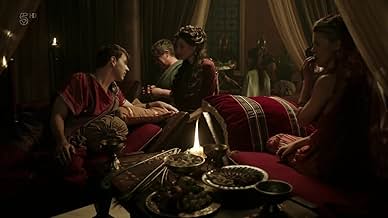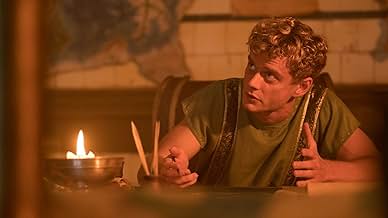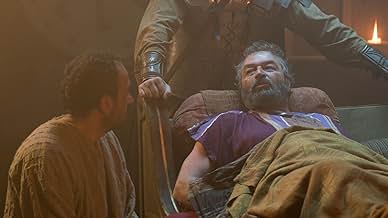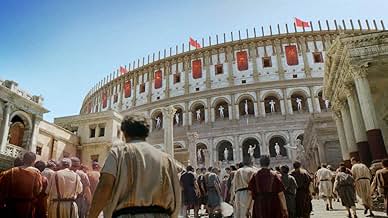Historian Bettany Hughes selects eight pivotal days that defined the Roman Empire and its establishment as the world's first superpower.Historian Bettany Hughes selects eight pivotal days that defined the Roman Empire and its establishment as the world's first superpower.Historian Bettany Hughes selects eight pivotal days that defined the Roman Empire and its establishment as the world's first superpower.
Browse episodes
Featured reviews
I hope this series gets recognition for excellence that it deserves. This was a fascinating journey through time and history unlike any television experience that I can remember. I found myself eagerly awaiting the arrival of the dreaded Monday for the arrival of the next installment. The host was engaging I feel truly captured the essence of each tale. Also, the tales themselves were great, both riveting and interesting. I love how the actual locations and artifacts were incorporated into each episode to make immersion into to time and place complete. Bravo to Smithsonian channel and to all of those involved.
Keeps reminding of how "violent", corrupted and degenerated roman society was, apparently forgetting that you cannot apply today's metric to a civilization of 2k years ago. Why bother mentioning Rome's contribution to civilize Europe, between wn one massacre and the other?
A fairly superficial coverage of significant events in Roman history.. I don't think I learnt anything new at all, and I thought the dramatisations a bit simplistic, and quite unnecessary. I also though it a mistake to have the presenter dressed so as to emphasise her ample cleavage.
Bring back Mary Beard - she makes the most mundane of Roman things interesting and exciting.
I found the whole series bias against Rome, but the Caesar one irritated me the most. She seems to misunderstand what the Roman Republic was: An oligarchy. The Senators weren't elected, they were pulled from the aristocracy. There was no representation of the people until the Senate was forced to give the plebs representation in the form of tribunes only because they needed the plebs help in a war. And the Senate literally lynched the first couple of tribunes who actually moved to really help the plebeians and heal some of the empires problems. So Caesar was fighting fire with fire only after many many popularii and tribunes were murdered by an aristocratic leader named Sulla. He literally marched an army in and killed every popularii he could which was the first time that was ever done. The show drastically mistakes the Republic and how they viewed common people and even their middle class. She also drastically misrepresents the Germanic and Celtic people of that time. They were brutal and frequently attacked Rome. The Cimbric War is a prime example of German civility. And the Celts invaded constantly and even managed to sack Rome once.
Firstly, there is some utterly disgusting comments here from other reviewers regarding the appearance of the presenter- not necessary, .
The series itself is obviously meant to be snapshots of the history around some important days, and these days just so happen to be centred around acts of war and the like, so that's important to keep in mind- very few of these events were without death and bloodshed. There are also lots of arguments that you shouldn't view these events through a modern moralistic lens- but why shouldn't we? Genocidal acts are horrible, no matter when they happened in our historical timeline, it's important to get both sides of this, especially when accounts at the time lament the death and destruction.
It's a nice change from the usual glorification of all things Rome, and I don't think it is biased as other people say, I think that it is balanced. Sure there are more details that could have been mentioned, but with the run time of each segment (~50min or so) there's only so much room there. Hopefully if anyone sees this and wants more info on any of the stories, they will seek it out.
The series itself is obviously meant to be snapshots of the history around some important days, and these days just so happen to be centred around acts of war and the like, so that's important to keep in mind- very few of these events were without death and bloodshed. There are also lots of arguments that you shouldn't view these events through a modern moralistic lens- but why shouldn't we? Genocidal acts are horrible, no matter when they happened in our historical timeline, it's important to get both sides of this, especially when accounts at the time lament the death and destruction.
It's a nice change from the usual glorification of all things Rome, and I don't think it is biased as other people say, I think that it is balanced. Sure there are more details that could have been mentioned, but with the run time of each segment (~50min or so) there's only so much room there. Hopefully if anyone sees this and wants more info on any of the stories, they will seek it out.
- How many seasons does Eight Days That Made Rome have?Powered by Alexa
Details
- Release date
- Country of origin
- Official site
- Language
- Also known as
- 8 Days That Made Rome
- Filming locations
- Production company
- See more company credits at IMDbPro
Contribute to this page
Suggest an edit or add missing content






























